'Spider-Man: Homecoming' & 'Wonder Woman' Teach Studios to Understand the Heart of Their Superhero Characters
Behind all the special effects, behind all the action and intrigue, I think we're in danger of forgetting just what our superheroes really mean.
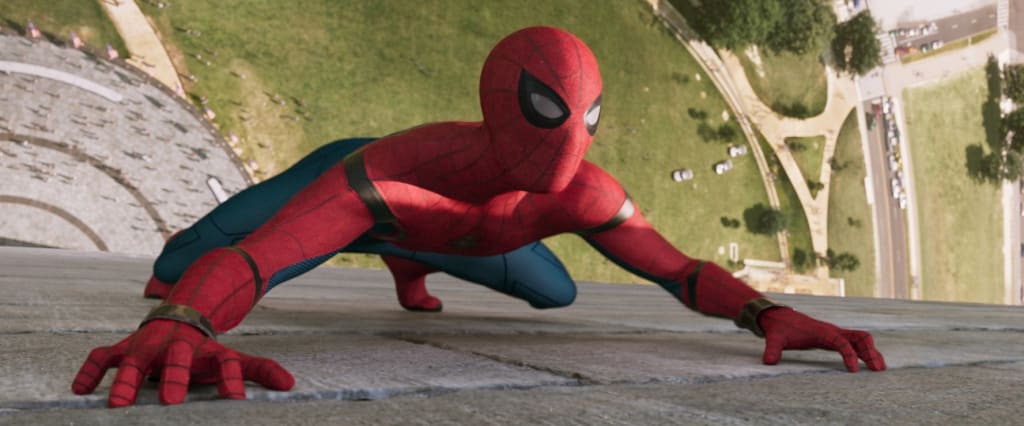
It's hardly disputable that we're living in the Golden Age of superhero movies. The Marvel Cinematic Universe is a commercial juggernaut, breaking $11 billion in global box office takings back in April this year. The DC Extended Universe may have struggled to find a firm footing, but the dramatic success of Wonder Woman has left fans delighted, and later this year we're going to see the heroes of the Justice League unite on the big screen for the first time. Meanwhile, Fox's tentpole X-Men movies may have failed to impress, but the studio is redefining the whole genre with risky, experimental films like Deadpool and Logan.
But behind all the special effects, behind all the action and intrigue, I think we're in danger of forgetting just what our superheroes really mean.
Looking A Little Bit Deeper
It's a truth that will be self-evident to any comic book fan: not all superheroes are created equal. There's something about some characters that seems to transcend the pages of comic books, leaving a lasting mark on their readers. These are the heroes whose stories we celebrate, whose struggles become our own, and whose causes we go on to champion in the real world. These characters may be fictional, but in truth they speak to human nature itself.
This, I firmly believe, is one reason Wonder Woman proved so successful. Strip away all of the CGI and superheroes, and this movie is a clash of ideologies. On the one hand, you have Ares, who believes that man is irredeemable. On the other, you have #WonderWoman, who believes that human beings are not beyond redemption. That final battle is won because Diana sees Steve Trevor's willingness to give his life for others, and is persuaded that the light of love in the heart of men will always break through the darkness. This is philosophical debate presented to us as a superhero spectacle, with Diana championing our cause. She stands for something.
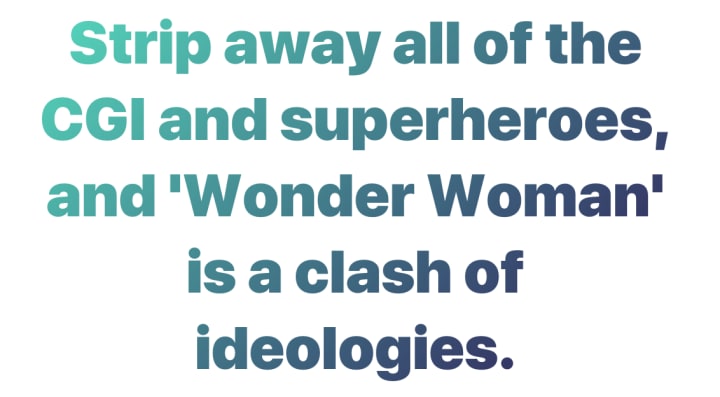
It's why the world reacted with shock and fury last year, when #Marvel Comics rewrote Steve Rogers as an agent of #Hydra. For many fans, the fictional character of Captain America had become a living embodiment of all that was good in the United States. He embodied the American Dream. When the weak, struggling Steve Rogers was chosen by Doctor Abraham Erskine to become America's super-soldier, he demonstrated that even the most frail man can be transformed by selfless compassion and a patriotic belief in justice. Captain America may be a physical powerhouse, but it's his heart that make him a hero. The fan backlash against this so-called 'HydraCap' arc was startling in its intensity.
The Superhero Problem
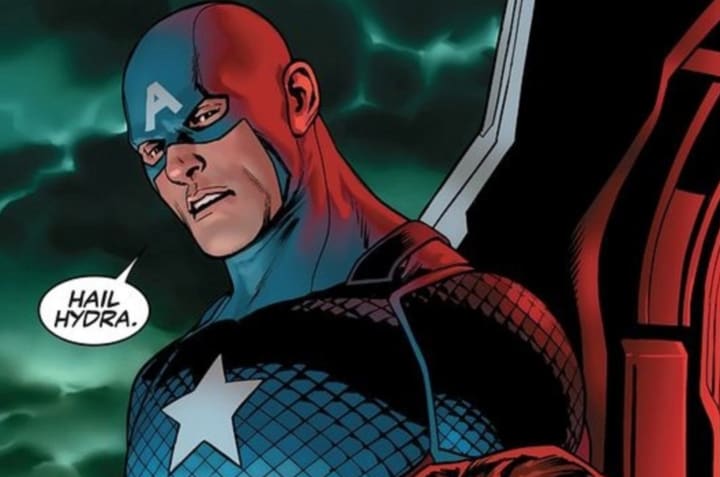
The example of HydraCap proves an important point: that companies can fail to understand just what it is that makes their heroes so iconic. At first, Marvel was defiant in defence of the plot. By the time it was building up to this year's Summer Event, #SecretEmpire, they were taking a different tone. In an unprecedented press statement, Marvel asked readers to be patient, and reassured fans that the conclusion would be a satisfying one for lovers of Captain America.
"What you will see at the end of this journey is that [Captain America's] heart and soul — his core values, not his muscle or his shield — are what save the day against Hydra and will further prove that our heroes will always stand against oppression and show that good will always triumph over evil."
It's staggering that the publisher actually wound up in a place where it was essentially having to present an apology for its own story.
But this raises a disturbing issue for movie studios; if even the comic book publishers can miss a superhero's core concept, then so can the studios. That's why Fox's tentpole #XMen films are still struggling; the core concept of the X-Men is of a battle against prejudice, with writers often striking deliberate parallels to various battles for equal rights. The X-Men are fundamentally about the war against bigotry and prejudice, but arguably, that hasn't been a central theme of the films since 2003's X2. Ironically, the next X-Men TV show, #TheGifted, looks set to capture that theme better than any of the last four tentpole X-Men movies.
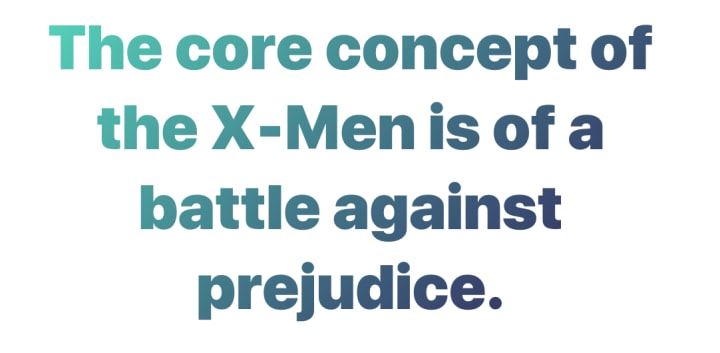
Even Marvel Studios can miss it. The core concept of Spider-Man, for example, is a simple message; "With great power comes great responsibility." The greatest weakness of #SpiderManHomecoming is, fundamentally, that the film doesn't explore this theme at all. Peter isn't motivated by a sense of responsibility; instead, he simply thinks superheroism is cool, and wants to impress Tony Stark.
It's true that, in classic Spider-Man fashion, time and again Peter is forced to choose between being a hero and being a kid; he misses the Academic Decathlon, for example, and abandons Liz at the Homecoming dance. But in both cases, the film's script blunts the impact of these decisions. The Decathlon team aren't mad at Peter; a near-death experience means they have other things to think about. Liz is more focused on her father's arrest than on the fact Peter let her down in a way that would crush any teenage girl.
Homecoming is a wonderful film, filled to the brim with vibrant energy and an exuberant sense of joy that makes it a pleasure to watch. I walked out of the cinema thrilled. But for all Homecoming's strengths, the film fails to capture the heart of what makes Peter Parker Spider-Man. Marvel has substituted youth and energy for power and responsibility. Right now, with Homecoming having overtaken Andrew Garfield's films in the domestic box office, that seems to be working out in the short term. Yet I can't help feeling Marvel will need to do a course-correction in the longer term, bringing the core tenets of Spider-Man's character and motivation to the surface more as we run through the trilogy and beyond.
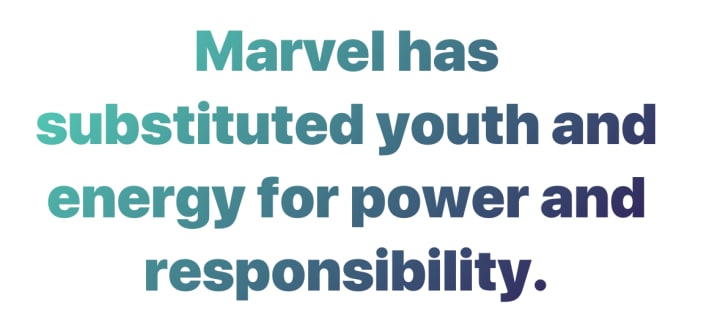
Let me give one further example by returning to Wonder Woman. The emotional heart of that film is, of course, the beloved No Man's Land scene. Everything builds up to this wonderful moment. As director Patty Jenkins explained:
"It's about her. We're not angry at the Germans. We don't care about the Germans and neither does she. This is what she needs to do to get across [No Man’s Land], and so it's about her."
This scene is the ultimate demonstration of Wonder Woman's heroism. She's moved by compassion, and she steps up, not knowing the limits of her abilities. For all she knows, she could be walking to her death, wasting her life on the battlefield when she should have been focused on Ares. But in the face of suffering, she simply cannot stand by. And her example inspires those around her to follow in her footsteps, with Diana taking enemy fire so the British forces can follow her over the trenches.
And here's the irony. This was the scene Patty Jenkins had to fight for. Time and again, she was forced to explain to the studio why this scene mattered.
“I think that in superhero movies, they fight other people, they fight villains. So when I started to really hunker in on the significance of 'No Man's Land,' there were a couple people who were deeply confused, wondering, like, ‘Well, what is she going to do? How many bullets can she fight?’ And I kept saying, ‘It's not about that. This is a different scene than that. This is a scene about her becoming Wonder Woman.’”
The challenge facing film studios isn't simply to make a comic-book-accurate movie, or to make a fun superhero film, or to improve the special effects and get in some good quips. The challenge is to identify what it is that makes a hero endure.
Superman made his debut in the 1930s. Captain America socked Hitler on the jaw in 1941. Most of our best-known Avengers and X-Men were created in the 1960s and '70s. These heroes endure because they speak to the core of our human nature. Like Peter Parker, we struggle to deal with guilt and responsibility; like the X-Men, we must battle for equality; like Wonder Woman, our faith in humanity is challenged by the brutal nature of our world.
Right now, we're in the Golden Age of superhero movies. The danger, though, is that studios can so easily become focused on the trappings, the CGI, the action sequences, and the work to build a shared universe. All these things are important, but nothing is more important than finding the core concept that makes that superhero endure through the decades.
About the Creator
Tom Bacon
A prolific writer and film fan, Tom has a deep love of the superhero genre.


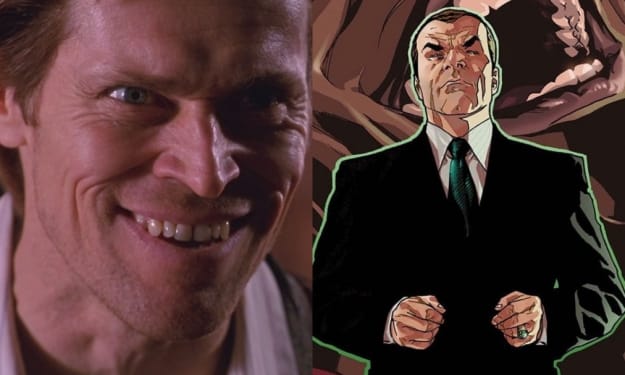



Comments
There are no comments for this story
Be the first to respond and start the conversation.